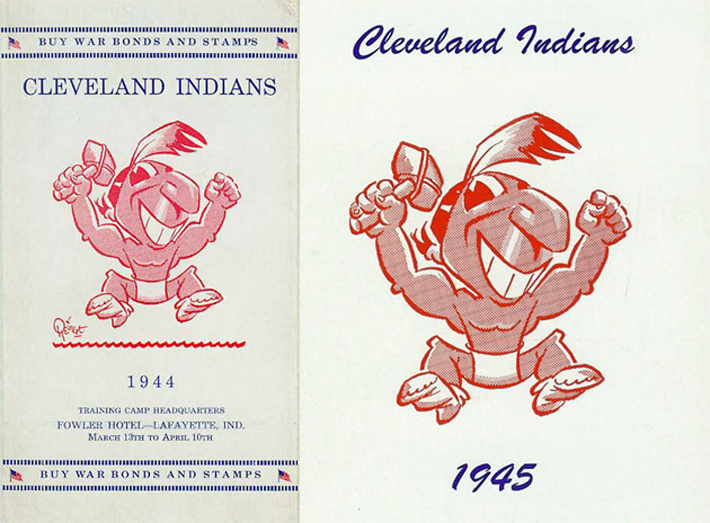
1881 founding of Tuskegee Institute by Booker T. Washington
1896 Plessy v. Ferguson
1909 NAACP
1914 Garvey’s UNIA
1916 Jeannette Rankin of Montana is the first woman elected to Congress; ashamed of losing to a woman, her primary opponent commits suicide
1923 Equal Rights Amendment, written by former suffragist Alice Paul, is introduced in Senate to commemorate 75th anniversary of Seneca Falls Declaration: “Equality of Rights under the law shall not be denied or abridged by the United States or any state on account of sex”; reintroduced in every subsequent congressional session, 1923-70 (see further discussion lower down).
1929 LULAC, JACL founded
1930 Nation of Islam founded
1937 the first time the Gallup Poll asks how many Americans would vote for a woman for President. 1/3 say they would. (League for a Woman President founded 1935. According to this article, an astrologist predicted a female VP in 1940, missing by only 44 years.)
1941 A. Philip Randolph's March on Washington; E.O. 8802 desegregates hiring in defense work (military desegregated 1947)
1942 E.O. 9066 mandates Japanese internment
1942 CORE
1944 Korematsu v. US
1946 Woody Strode and Kenny Washington re-integrate NFL, which had had black players until 1933.
1947 Mendez v. Westminster: Ca. Supreme Court decides that Mexican-American students' school segregation is illegal but does not invalidate Plessy, as they are understood to be "white." Jackie Robinson (re-)integrates major-league baseball, which had had black players through 1884.
Cleveland Indians introduce their new mascot, Chief Wahoo. Here's the original version, from WWII:
The new version, designed by 17-year-old Walter Goldbach, is supposed to "convey a spirit of pure joy and unbridled enthusiasm." He adds in a 1999 interview that "the last thing on my mind was trying to offend anybody."
Here's what he came up with:
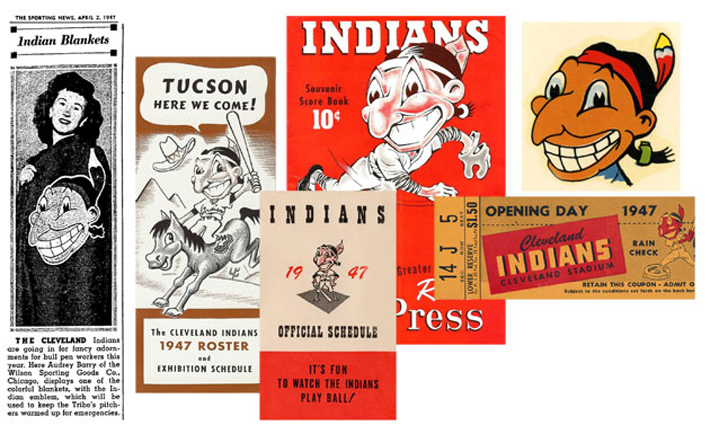
As of 2018, the Indians pledged to retire the mascot.
1948 Oyama v. Ca.--Supreme Court rules that Ca.'s Alien Land Law, which denies non-citizens ineligible for citizenship (ie Asians) or their citizen children the right to own land, is unconstitutional when it denies citizen children the land; California becomes first state to legalize interracial marriage; Dixiecrat revolt begins to split off S white Democrats from N Democratic party
1949 48% of those polled would vote for a woman for President; reaches 52% in 1955, 53% in 1969
1950 Chuck Cooper and Earl Lloyd integrate NBA. Harry Truman signs Uniform Code of Military Justice, which sets up discharge rules for gay members of the armed forces.
1951 Mattachine Society formed (first open pro-gay organization); FBI begins internal-security probe of the group, 1953. Playing for Drake University against Oklahoma A&M, Johnny Bright was repeatedly violently attacked by white players, including defensive tackle Wilbanks Smith, who used racially derogatory language and incited his teammates to target Bright. Oklahoma A&M had been integrated in 1949, but racism remained, and locals had been boasting that after the game, Bright would be eliminated. In a series of aggressive tackles during the first seven minutes of the game, Bright was knocked unconscious three times. The final hit from Smith broke Bright’s jaw, forcing him to leave the game. A series of photos documenting the attack was published in the Des Moines Register, eventually made the cover of Life Magazine, and won them the 1952 Pulitzer Prize for photography.
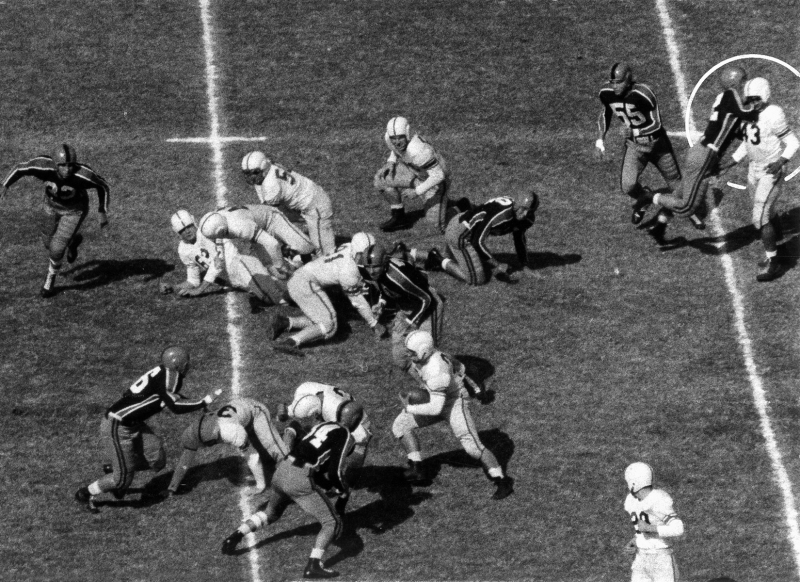
1953 Eisenhower's Executive Order 10450 allows government workers to be fired
for, among other things, "any criminal, infamous, dishonest, immoral, or
notoriously disgraceful conduct, habitual use of intoxicants to excess, drug
addiction, sexual perversion." Though records are incomplete, 400 government employees per year resign or are fired for "sexual perversion," 1953-55. State Dept. reports 1000 such firings by 1960. Ban on gay civil-service employees finally lifted, 1975.
1954 Brown v Board of Ed. After Game 1 of the World Series (most famous for Willie Mays' catch of Vic Wertz' drive in deep right-center), won by pinch-hitter Dusty Rhodes' home run into the extremely short porch in right field in the Polo Grounds (a cheap and therefore [?] "Chinese" homer--possibly derived from the 19th-century phrase "not a Chinaman's chance," meaning highly unlikely), columnist Dick Young of the New York Daily News writes that "the story of the Giants’ 5-2 victory over Cleveland …should be written in vertically, from top to bottom…in Chinese hieroglyphics. It was won on a 10th inning homer that was not only sudden death but pure murder…right out of a Charlie Chan yarn. Ming Toy Rhodes, sometimes called Dusty by his Occidental friends, was honorable person who, as a pinch hitter, delivered miserable bundle of wet wash to first row in rightfield of Polo Grounds, some 259 1/2 feet down the block from the laundry." In response, Shavey Lee, the “unofficial mayor of Chinatown,” wrote in protest that “it isn’t the fault of the Chinese if you have 258-foot fences.”
1955 Daughters of Bilitis formed (first open lesbian organization); FBI begins internal-security probe of the group, 1959. Sports Illustrated's baseball-season preview shows Giants manager Leo Durocher, star Willie Mays, and Durocher's wife, actress Laraine Day, arm-in-arm:
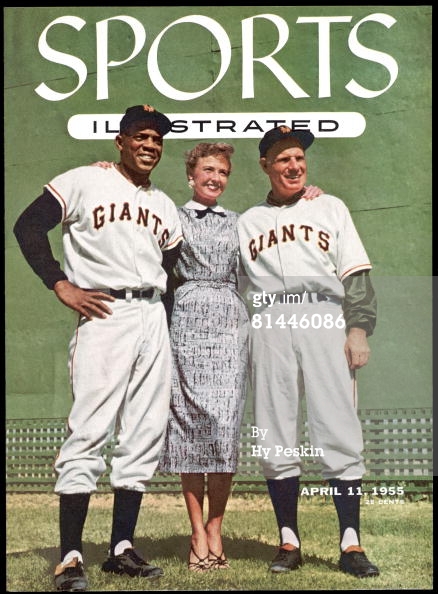
the magazine's letters column, two weeks later:
1865
Sirs:
...Up until now I have not found anything in particularly bad taste in SI, but by golly, when you print a picture on the cover (SI, April 11) in full color, of a white woman embracing a negro (with a small letter) man, you make it evident that even in a magazine supposedly devoted to healthful and innocent sports you have to engage in South-baiting....
I care nothing about those three people as individuals, but I care a heck of a lot about the proof the picture gives that SI is part of the giant plan to flaunt all decency, so long as the conquered of 1865 can be reminded of their eternal defeat. This is the kind of sporting instinct SI has!...
F. M. ODOM, Shreveport, La.
LET ME SAY, SIR
Sirs:
...To tell you that I was shocked at SI's cover would be putting it mildly....The informative note inside the magazine tells me that this is Mrs. Leo Durocher, a white woman, with her arm affectionately around the neck of Willie Mays, a Negro ballplayer....
Let me say to you, Sir, the most appalling blow ever struck at this country, the most disastrous thing that ever happened to the people of America, was the recent decision of the Supreme Court declaring segregation unconstitutional....
EDWARD F. WEBB, Nashville, Tenn.
INSULT
Sirs:
Please cancel my subscription to SI immediately....This is an insult to every decent white woman everywhere....
T. B. KELSO, Fort Worth, Texas
INTEGRITY
Sirs:
...Such disgusting racial propaganda is not fit for people who are trying to build a stronger nation based on racial integrity.
A. C. DUNN, New Orleans
BEST
Sirs:
In regard to your April 11 cover, it is the best yet.
ALBERT L. TABORN, Cleveland
1955-56 Montgomery Bus Boycott; segregated Sugar Bowl ticket, 1955: 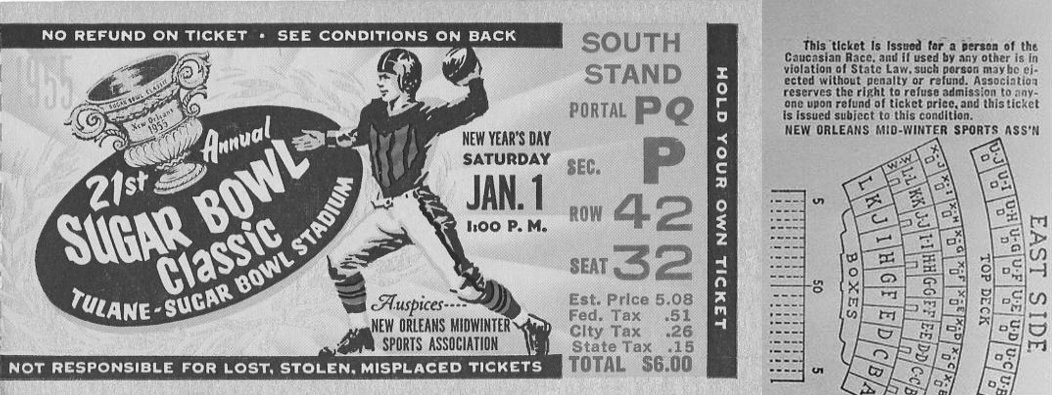
1957 SCLC formed after bus boycott; Little Rock Nine integrate Central High School.
1958 in a Gallup poll: 60% of white Americans say they would NOT vote for a qualified African-American presidential candidate nominated by their own party. In 1980, less than 20% say so. In 1990, less than 10% do. In the 2010 edition of the survey, the most recent version to ask this question, 6 percent of white Republicans and 3 percent of white Democrats said they would not.
Mississippi’s Senate Bill #2079 gives the Governor the authority to close “one or all schools” in the state when “he decides such closure to be the best interest of the majority of educable students”; that year, Clennon King, a teacher at all-black Alcorn A&M, applies to Ole Miss’ history graduate program. He is not admitted. Instead, state authorities place him in a mental institution for less than two weeks, since any black person wanting to attend Ole Miss must be insane. King’s father had been Booker T. Washington’s chauffeur and a student at Washington’s Tuskegee Institute. His brother gets him released after about 10 days in custody. In 1960, King runs for President on the Independent Afro-American Party ticket, winning almost 1500 votes in Alabama.
Giants move to SF; Willie Mays cannot buy a house in Miraloma Park
1959 Mike Wallace’s “The Hate That Hate Produced” documentary makes Malcolm X a national figure by pairing him with leaders of the American Nazi party. Boston Red Sox are last MLB team to integrate.
1960 SNCC's lunch-counter sit-ins. Women are 6% of American doctors, 3% of lawyers, <1% of engineers, 1.4 % of top 4 pay grades in US government. 5.4% of African-Americans ages 25-29 have graduated from college (15.4%, 1995); they comprise 2.2% of medical-school students (8.1, 1995). Newsweek reports that 60% of the women entering college drop out before graduation, most to get married. At Barnard, graduating seniors (2/3 of class of 1960) with fiancees are handed corsages; those without are handed lemons. From a Shirley Povich column in the Washington Post about the still-segregated Redskins, 10/31/60: "For 18 minutes the Redskins were enjoying equal rights with the Cleveland Browns yesterday....Then it suddenly became unequal in favor of the Browns, who brought along Jim Brown, their rugged colored fullback from Syracuse. From 25 yards out, Brown was served the football by Milt Plum on a pitch-out and he integrated the Redskins' goal line with more than deliberate speed....The Redskins' goal line, at least, became interracial."
1961 Freedom Rides; Albany Movement starts; JFK’s Executive Order 10925 instructs federal contractors to take “affirmative action to ensure that applicants are treated equally without regard to race, color, religion, sex, or national origin”; SF drag queen Jose Sarria runs for supervisor, becoming first openly gay candidate for public office in US history. Washington Redskins are final NFL team to integrate, though only after threat by Sec of Interior to deny them use of publicly-financed stadium if they don't; Washington Post columnist Shirley Povich: "the Redskins' colors are inflexibly burgundy, gold, and Caucasian." Supreme Court rules unanimously that a Florida law making jury duty mandatory only for men does not deny women justice in court, noting in classic separate-spheres fashion that the "practice of excluding women from the jury pool" protects them "from the filth, obscenity, and obnoxious atmosphere...of the courtroom." Justice John Marshall Harlan II: "woman is still regarded as the center of home and family life."
The CRM remains unpopular: in a May 1961 survey by Gallup, 22% of Americans support what the Freedom Riders are doing; 57% say that lunch-counter sit-ins and freedom rides are hurting chances for integration; just before the March on Washington (Aug. 1963), only 23% have favorable opinions of the March1962 SDS; Albany Movement fails.
Episcopal preacher T. Robert Ingram tells
White Citizens' Council, "If any man suffers as a Christian let him not
be too naive to admit that what is called 'integration' is nothing
more than the organized attack of the forces of Hell upon God's order in nature
and in human society. To be integrated means to be unified. The root word,
integer, means 'one.' I say that we now, as a part of God's world,
are already fully integrated under the sovereignty of Jesus Christ. We are
unified. We are one. Those who say we must be made one, that we must become 'integrated,'
are
in fact saying that Christ does not rule--that He has not made us one!"
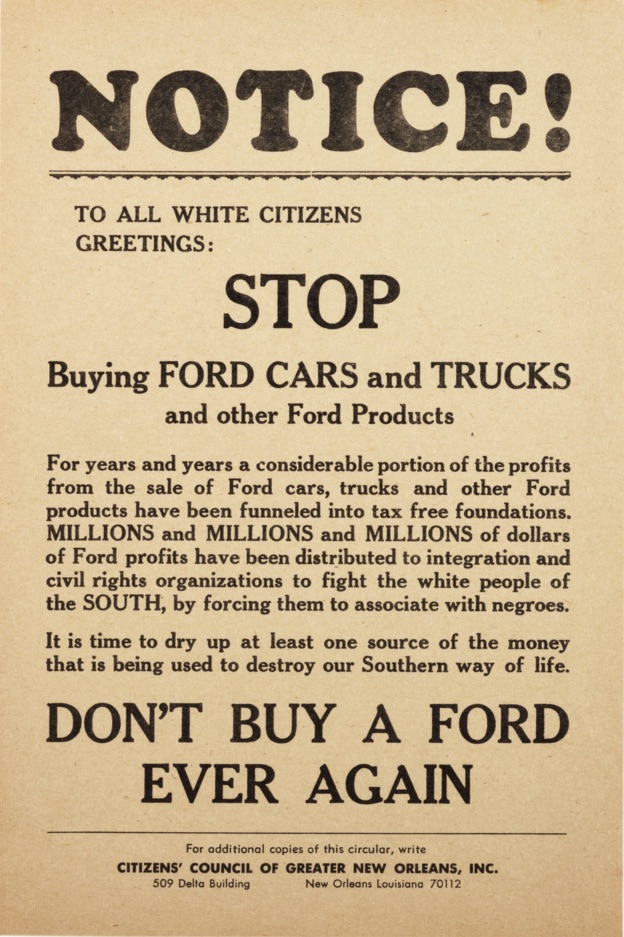
In a Gallup poll, nearly 2/3 of women 18-60 don't approve of the idea of a female President. In U. Michigan poll, more than two-thirds of the women surveyed agree that most important family decisions “should be made by the man of the house.”
1963 JFK signs Equal Pay Act, an amendment to the 1938 Fair Labor Standards Act, mandating equal pay for equal work for men and women; MLK’s letter from Birmingham; march on Washington (King's "I have a dream" speech); responses: SF Examiner: "a profoundly moving demonstration--so big, so orderly, so sweetsinging and good-natured, so boldly confident and at the same time relaxed, so completely right from start to finish, that America was done proud beyond measure"; Chattanooga Free Press: "the marchers were not primarily seeking to gain civil rights for themselves but to deprive others of their civil rights so that demonstrators might have what belongs to others"; JFK assassinated, with Civil Rights Act stuck in Congress; LBJ, "master of the senate," gets it through; students at Radcliffe (a women's college) can now get Harvard degrees; schools share graduation ceremonies 1970 and co-ed dorms begin 1972
1964 Freedom Summer; Goodman, Chaney, Schwerner murdered in Mississippi. Maine Republican Margaret Chase Smith runs for President.
Civil
Rights Act: The newly sworn-in Johnson was firmly counseled by an ally against
using the political capital he’d inherited as a result of the assassination
on such a hopeless cause. According to his biographer, Johnson responded, “Well,
what the hell’s the presidency for?” Southern filibuster is broken with votes from 4/5 of Republicans, 2/3 of Democrats; 27 of 33 Senate Republicans vote for it. 57% of respondents to a New York Times poll think that the CRM has gone too far; 54% think the movement is "going too fast"; 80% oppose pairing schools to promote desegregation in NYC.
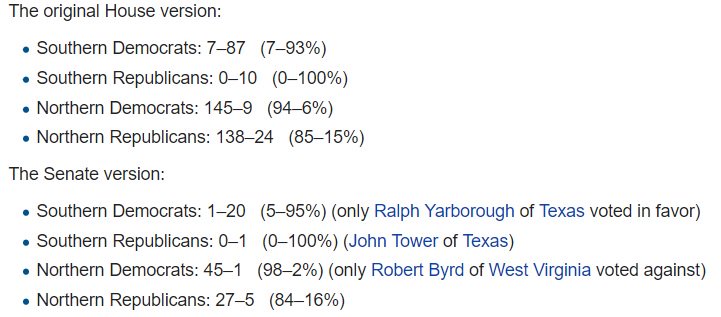
Title VII of the Civil Rights Act prohibits “discrimination in employment based on race, color, sex, national origin, or religion.” New Republic thinks this is a waste of time: "Why should a mischievous joke perpetrated on the floor of the House of Representatives be treated by a responsible administrative body with this kind of seriousness?" Only Hawaii and Wisconsin protect women from employment discrimination. New York Times article: "homosexuals proud of deviancy."
Free Speech Movement started at Berkeley by returning Freedom Summer students; at same time, Ca. voters overwhelmingly support (2-1) Prop. 14, which bans state from infringing on rights of holders of private property to sell or rent, or not sell or rent, to whomever they see fit (ruled illegal by Ca. Supreme Ct., 1966): "Neither the State nor any subdivision or agency thereof shall deny, limit or abridge, directly or indirectly, the right of any person, who is willing or desires to sell, lease or rent any part or all of his real property, to decline to sell, lease or rent such property to such person or persons as he, in his absolute discretion, chooses."
letter from Justice Department investigators describing use of literacy tests in Dallas, 1964A listing of racial incidents in one Mississippi county, 1964.
 (Pike
County is in red.)
(Pike
County is in red.)
% of popular vote for Goldwater in states that he won, 1964:
Mississippi 87
Alabama 69
South Carolina 59
Louisiana 57
Georgia 54
Arizona 50
Black vote for Democratic presidential candidates:
2012 Obama gets 93% of black vote
2008 Obama gets 95% of black vote
2004 Kerry gets 89%
2000 Gore gets 90%
1996 Clinton gets 84%
1992 Clinton gets 83%
1988 Dukakis gets 90%...
1964 Goldwater gets 6%
1960 Nixon gets 32%
1956 Eisenhower gets 39%
Jewish vote for Democratic presidential candidates:
1960 JFK 82%
1964 LBJ 90%
1968 Humphrey 81%
1972 McGovern 65%
1976 Carter 71%
1980 Carter 45%
1984 Mondale 67%
1988 Dukakis 64%
1992 Clinton 80%
1996 Clinton 78%
2000 Gore 79%
2004 Kerry 76%
2008 Obama 78%
2012 Obama 69%
gay vote for Republican candidates:
2000 GW Bush 25%
2004 GW Bush 19%
2008 McCain 27%
white college-educated vs. non-college educated votes for Democrats:
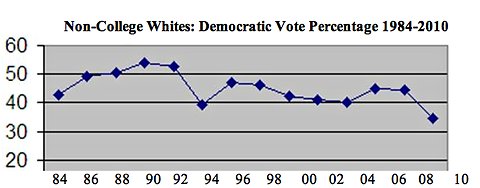 |
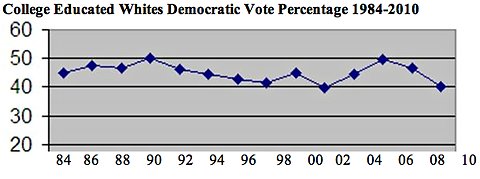 |
Latino vote:
Nixon got 35%, 1972
Ford and Dole, 1976 and 1996 respectively, got 21-25% each
Reagan got about 42%, 1984
George W. Bush got 44 percent in 2004
John McCain 31 in 2008
Obama won 71-27 in 2012
the gender gap:
men vote for the Republican candidate and women for the Democrat in 1996, 2000, and 2004. (In 2000, Gore wins the women's vote by 11 points, and Bush the men's vote by 9 points.) In 2008, Barack Obama wins the women's vote by 13 points and the men's vote by 1%. In 2012, Obama ran 10% ahead among women and 23 points higher among unmarried than married women. In 1952 59% of women lean to or identify with Democrats; in 2008, 55%. Comparable figures for men are 60% in 1952 and 47% in 2008.
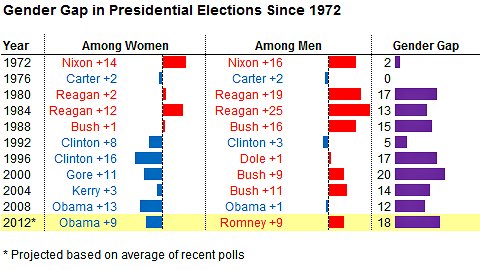
white vote for Democrats: LBJ, 1964, is the only Democrat to win the white vote since 1952:
2012 Obama gets 39% (Romney 59%)
2008 Obama gets 43%
2004 Kerry gets 41%
1992 Clinton gets 46%
1988 Dukakis gets 40%
1984 Mondale gets 35%
1980 Carter gets 33%
1972 McGovern gets 31%
1968 Humphrey gets 36%
1956 Stevenson gets 39%
1952 Stevenson gets 40%
1965 Voting Rights Act (LBJ: "we just lost the South for a generation"). Johnson's speech at Howard officially calls for affirmative action: "you do not wipe away the scars of centuries by saying: Now you are free to go where you want, and do as you desire, and choose the leaders as you please. You do not take a person who, for years, has been hobbled by chains and liberate him, bring him up to the starting line of a race and then say, 'you are free to compete with all the others,' and still justly believe that you have been completely fair....To this end, equal opportunity is essential, but not enough, not enough."
Black Panthers founded; first summer riots in ghettoes in North; Malcolm X assassinated; Griswold v. Connecticut; after enormous Watts riot in LA, 64% of whites, 68% of Latinos (vs. 28% of blacks) say that police responded "well" to uproar.
% of African-American kids in school with whites, 1964-65:
West Va. 88.1
DC 86
Kentucky 62.5
Delaware 57.8
Maryland 51.7
Missouri 44.1
Oklahoma 31.7
Texas 7.26
Tennessee 5.33
Virginia 5.07
Florida 2.65
North Carolina 1.42
Louisiana 1.12
Arkansas .811
Georgia .377
South Carolina .100
Alabama .032
Mississippi .020
Northern segregation actually increases over this period: in Pittsburgh, for instance black children enrolled in primarily black secondary schools rises from 23% to 58%. In a poll, 82% of American males and 58% of females believe gay people are "harmful to American life"
1966 NOW; Miranda v. Arizona; in a very close vote, SNCC expels white members; "model minority" articles note that Japanese- and Chinese-Americans are doing well, despite discrimination and internment, without complaining (cf riots in inner cities); follow the story today. First stirrings of gay activism: sip-in in NYC, April; motorcade in LA in May protesting exclusion of gays from armed forces; in July, Vanguard is set up at SF's Glide Memorial; protest at Compton's Cafeteria
1967 Brown Berets; Summer of Love; Loving v. Va. legalizes interracial marriage
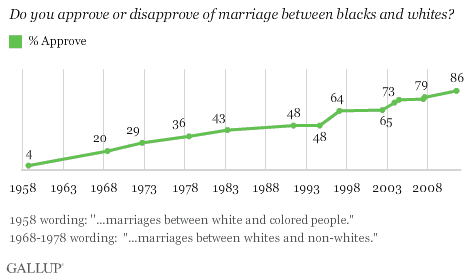
inner-city rioting reaches its worst, ravaging Detroit and Newark
1968 MALDEF, AIM; MLK and RFK assassinated 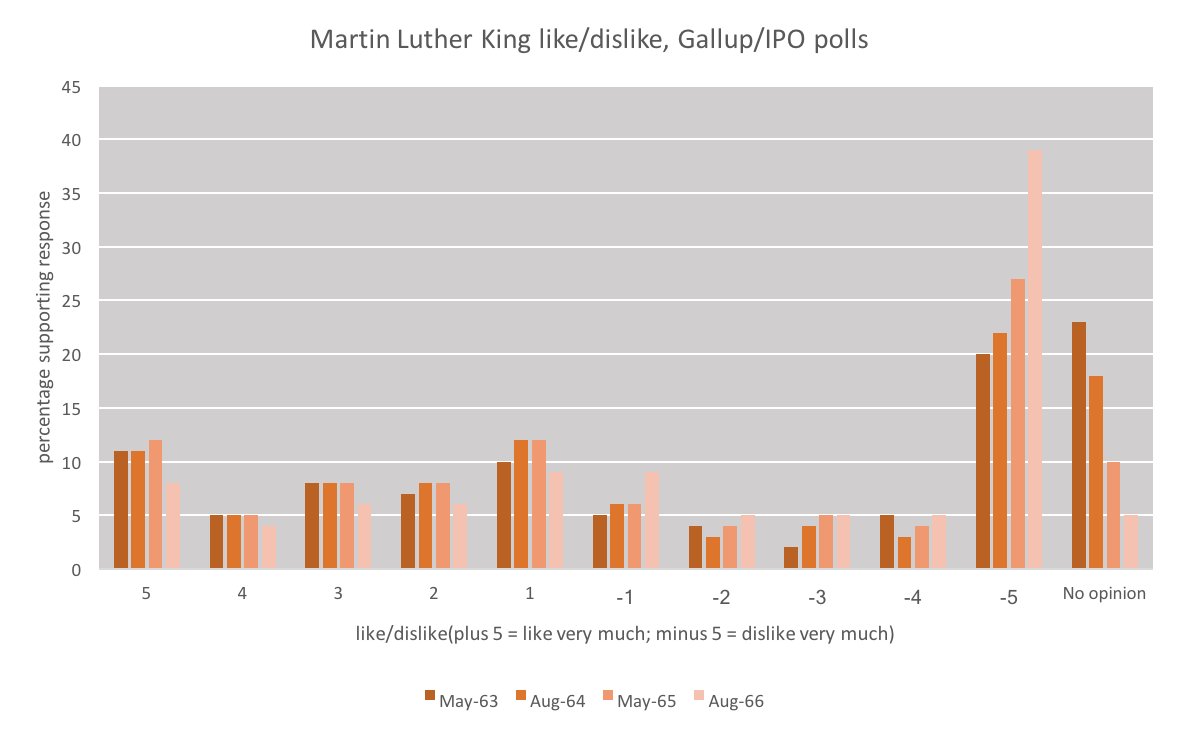
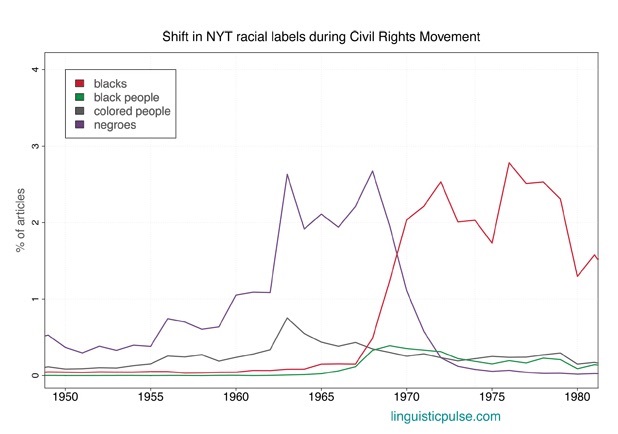
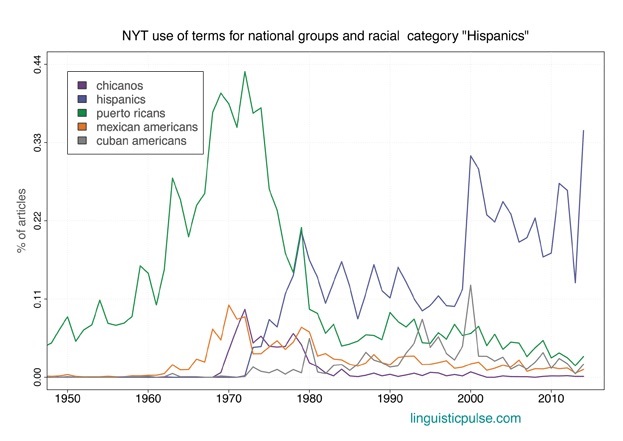
1969 Stonewall riot marks beginning of gay liberation movement; the first issue of Come Out!, the magazine that began publication that summer
civil-rights leaders on gay rights: Coretta Scott King: "For many years now, I have been an outspoken supporter of civil and human rights for gay and lesbian people. I've always felt that homophobic attitudes and policies were unjust and and unworthy of a free soceity and must be opposed by all Americans who believe in democracy" (1998); Julian Bond, 2005: "gay rights are civil rights"; John Lewis: "I fought too hard and too long against discrimination based on race and color not to stand up and speak against discrimination against our gay and lesbian brothers and sisters. I see the right to marriage as a civil rights issue" (2014) (For more, see this Twitter thread)
Indian sit-in at Alcatraz begins, lasting 19 months; Vassar admits men; Yale and Princeton admit women1970 Southern schools now often MORE integrated than Northern. Dean of U. Texas dental school admits no more than 2 women/class: "girls aren't strong enough to pull teeth." Women are 40% of dental-school grads, 2006. Degrees awarded to women:
| year | BAs |
PhDs |
MDs |
| 1960 | 38.5% | 10.5% | 5.5% |
| 1970 | 43.1 | 13.3 | 8.4 |
| 1980 | 49 | 29.7 | 23.4 |
| 1996 | 55.1 | 45.4 | 40.9 |
Law |
MBAs |
Engineering |
|
| 1960 | 2.5 | 3.6 | 0.4 |
| 1970 | 5.4 | 3.6 | 0.8 |
| 1980 | 30.2 | 22.4 | 9.3 |
| 1996 | 43.5 | 37.6 | 16.1 |
1971 House approves ERA, 354-24; in Swann v Charlotte-Mecklenburg, Supreme Court mandates busing within cities as a remedy for discrimination; for more on busing, see here and here. SF judge's order mandating busing to integrate schools is challenged by Latino and Chinese parents, who argue that it will destroy bilingual programs; busing program lasts until 1974, though it does not materially improve integration of SF public schools (38% of students attend racially imbalanced schools, 1971; 43% do, 1974). Mount Holyoke and Smith decide to stay women's colleges. 2/3 of public now approves of a woman running for President; reaches 78% in 1984, 92% in 1999. Congressional Black Caucus, National Women's Political Caucus founded.
1972 AIM’s “trail of broken treaties” march on Washington occupies the BIA; Title IX of the Education Amendments of 1972 mandates “No person in the United States shall, on the basis of sex, be excluded from participation in, be denied the benefits of, or be subject to discrimination under any programs or activity receiving federal financial assistance”; Senate approves Equal Rights Amendment, 84-8. Boston Marathon lets first women run. Billie Jean King is Sports Illustrated's athlete of the year, the first woman ever. Women's participation in sports explodes. There are 700 high-school girls playing soccer in the US in 1972; 121,700 in 1991, the year of the first Women's World Cup, and 390,400 in 2018.
Democratic convention permits first openly gay speakers at a political convention. Shirley Chisholm runs for President.1973 Roe v. Wade: Supreme Court legalizes abortion; wave of African-American mayors crests: Carl Stokes in Cleveland (1967); Kenneth Gibson in Newark (1970); 1973 sees Tom Bradley in LA, Coleman Young in Detroit, Maynard Jackson in Atlanta and Congressional passage of Home Rule Act, finally allowing black-majority DC to elect its own Mayor, which it does in 1974; American Psychological Association removes homosexuality from its list of mental disorders in DSM. ERA gains approval by 30 states. Little League allows girls to play. In Frontiero v. Richardson, Supreme Court rules 8-1 that women are allowed to claim men as their dependents on taxes without having to prove that claim (previously, men had been able to do so automatically, but women had had to submit proof that their husbands depended on them financially). Justice William Brennan: "there can be no doubt that our Nation has a long and unfortunate history of sex discrimination. Traditionally, such discrimination was rationalized by an attitude of 'romantic paternalism' which, in practical effect, put women not on a pedestal, but in a cage." shootout at Wounded Knee, site of 1890 massacre, between FBI agents and Native American activists.
Percentages of jobs held by women (all data from Bureau of Labor Statistics):
1970 |
1998 |
|
| managers and executives | 16.7% | 44.4% |
| college faculty | 28.6% | 42.3 |
| economists | 11.4% | 46.3 |
| psychologists | 38.5% | 62.1 |
| pharmacists | 12% | 44 |
| veterinarians | 5.2% | 32.5 |
| architects | 3.6% | 17.5 |
| women's pay /$1000 for men | $594 | $742 |
1974 AALDEF; in Milliken v. Bradley, Court rules that busing between cities and suburbs cannot be mandated. In its opinion, the Court notes that desegregation, "in the sense of dismantling a dual school system," does not require "any particular racial balance in each 'school, grade or classroom.'" Massachusetts state rep. Elaine Noble becomes first openly lesbian public official in US history. Congress bans sex discrimination in lending. Liberal Democrats introduce legislation extending civil-rights protection to gay men and lesbians.
1975 AIM battle with FBI at Wounded Knee; Indian Self-Determination Act; Time's "Person of the Year" is "the American woman," and it's International Woman's Year
1976 16 states have repealed their sodomy statutes that criminalize being gay; by 1980, 6 more have either begun repeal or had such laws declared unconstitutional (see Bowers v Hardwick [1986] and Lawrence v. Texas [2003]. Republican platform supports passage of ERA, as do both Republican candidates, Ford and Reagan. Military academies go coed. Pulitzer Prize winner is The Soiling of Old Glory by Stanley Forman, taken in Boston on April 5, 1976:
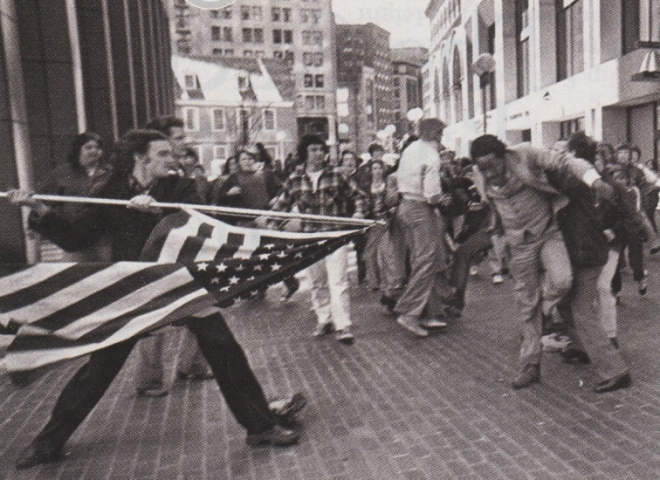
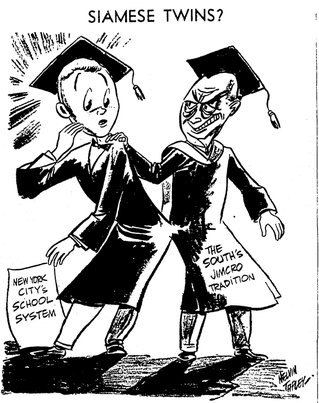

 How Kamala Harris's story fits in.
How Kamala Harris's story fits in.
1977 Indiana is 35th state to ratify ERA, 3 short of ratification as an amendment to the Constitution (due date 1979); Harvey Milk elected supervisor in SF; first openly gay elected official in US history. In poll, two-thirds of Americans believe that it is “much better for everyone involved if the man is the achiever outside the home and the woman takes care of the home and family.” By 1994, two-thirds of Americans reject this notion.
1978 Bakke v. Regents of UC allows Bakke, a white male, to gain admission to UC Davis medical school on charges of reverse discrimination, but also allows affirmative action to continue as long as race is only one of the relevant factors rather than the sole determinant; Proposition 6, banning gay/lesbian teachers from Ca. public schools (sponsor, state senator John Briggs: "one-third of San Francisco teachers are homosexuals. I assume most of them are seducing young boys in toilets"), defeated 58-42. It is opposed by, among others, former governor and future presidential candidate Ronald Reagan. Realizing that their laws failed to limit marriage to a man and a woman--no other arrangement had been imagined--by 1978, 15 states have written this limitation into law.
1979 average working woman earns 58 cents for every dollar a man makes. In 1994 it's 72 cents; with college degree, 83 cents.
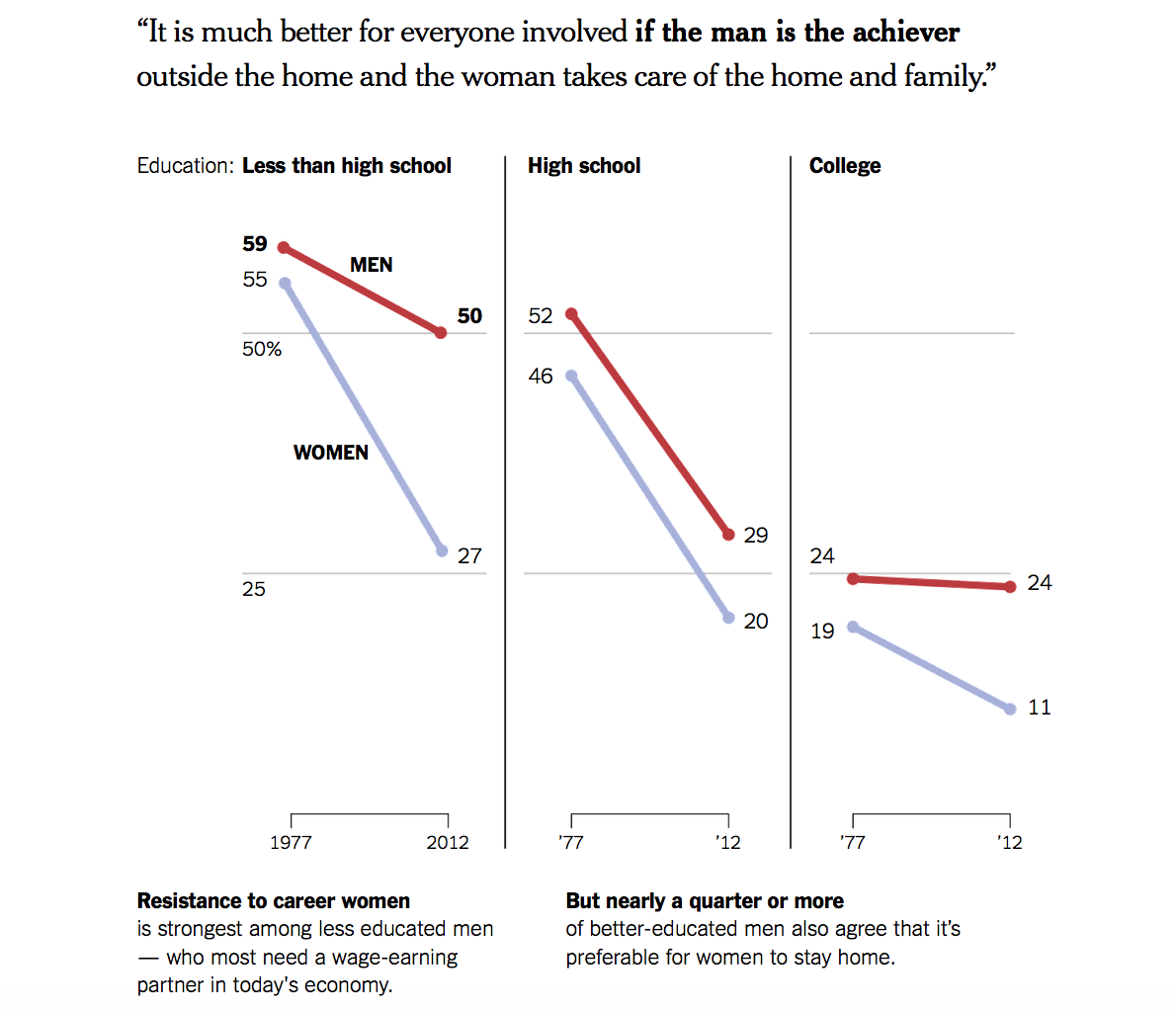
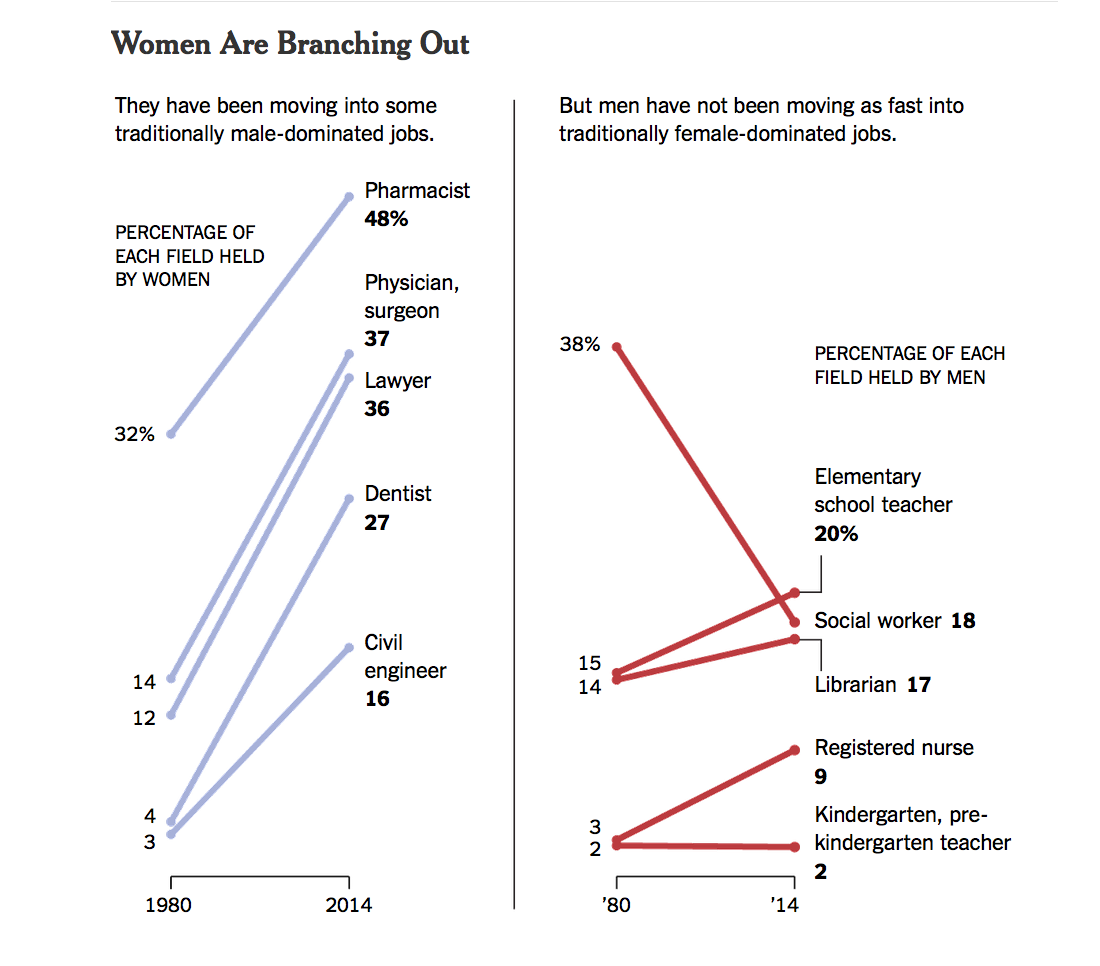
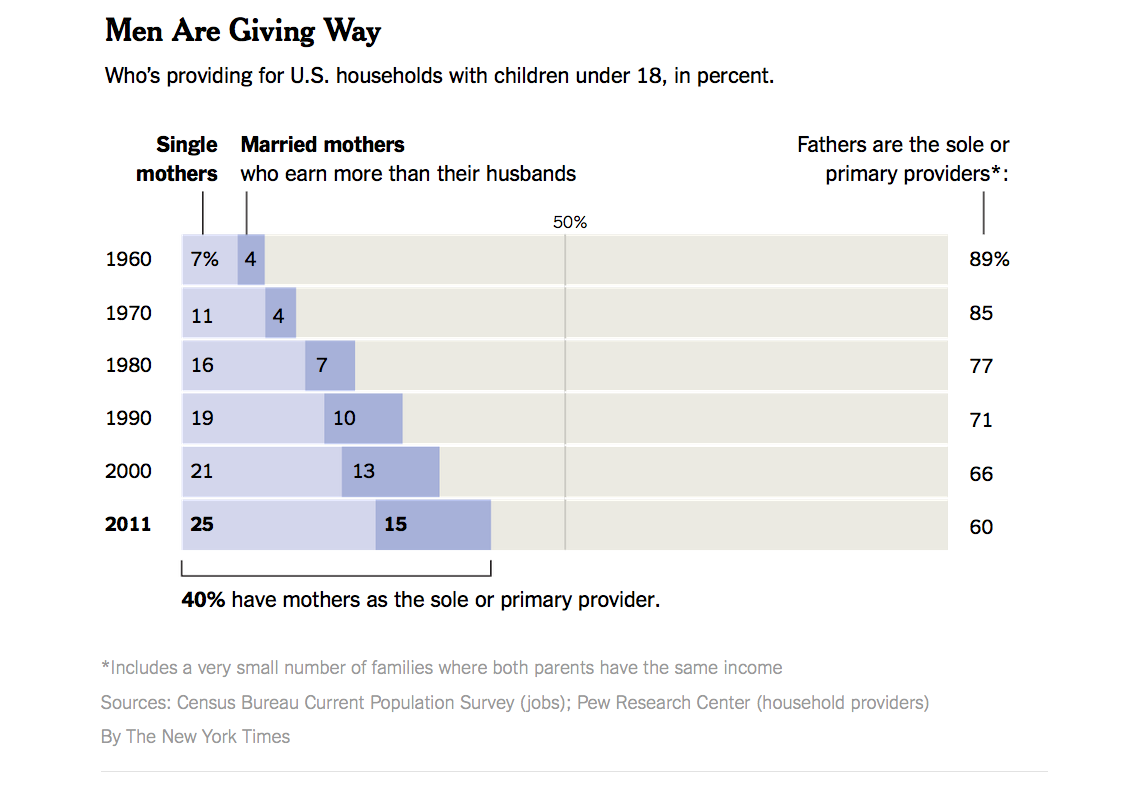
1980 69% of Mississippians favor school integration (74% regionally) and 86% of Americans do nationally. 30% of Mississippians favor residential segregation, compared with 32% nationally. Women are 25% of med students (from 9%, 1970) and 36% of law students (from 10%, 1970). Divorce rate sets a record for 18th consecutive year and is 3x rate in 1962.
1981 Ronald Reagan becomes first president to oppose ERA
1982 extended deadline passed, ERA fails; reintroduced in every session of Congress since; Defense Department officially proclaims that homosexuality is not compatible with military service.
ERA support:
10/74-8/82: public support for ERA always 56% or higher, opposition never higher than 34%
1982: respondents polled as to feelings about defeat of ERA.
no strong feelings one way or the other disappointed pleased
rejecting states 34 29 32
ratifying states 45 33 22
"The struggle over the ratification of ERA in the rejecting states in 1976 may, perhaps, be best understood as a clash between the five percent of the population who were attentive, active supporters of the amendment and the four percent who opposed it. This was not the case in the ratifying states, where informed primary voters who supported the ERA overwhelmed their opponent counterparts 84 to 16 percent."
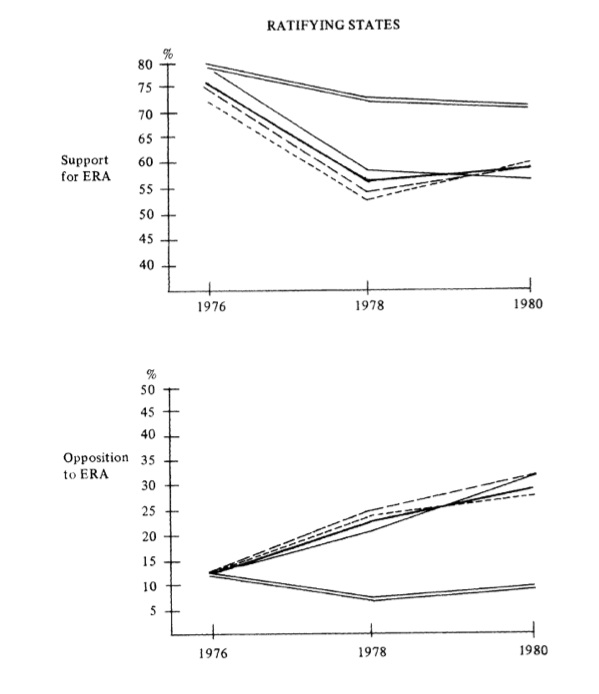 |
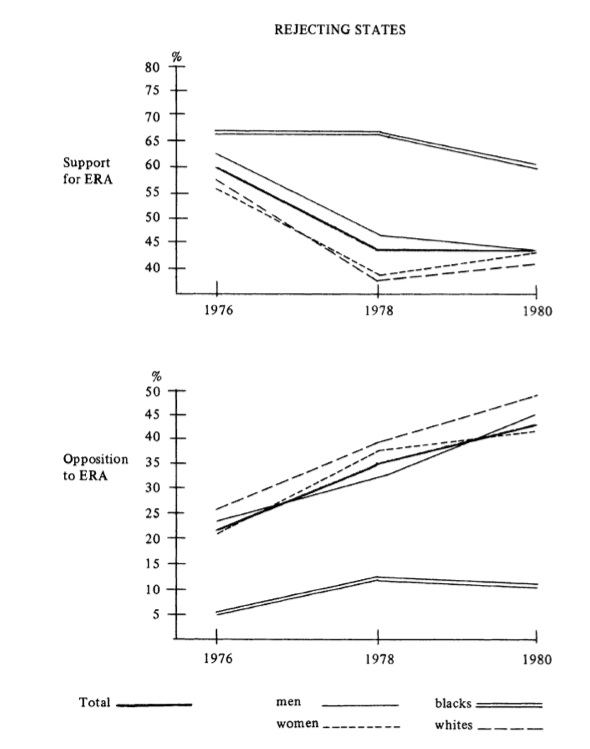 |

for more, see Louis Bolce, Gerald de Maio and Douglas Muzzio, "The Equal Rights Amendment, Public Opinion, & American Constitutionalism," Polity 19,4 (Summer 1987): 551-569. (Available on JSTOR, through UHS library.)
1984 Palmore v. Sidoti: Anthony and Linda Sidoti, both Caucasians, were divorced and Linda was awarded custody of their daughter. One year later, Anthony sought custody of the child after Linda began cohabitating with Clarence Palmore, an African-American. The Florida courts awarded Mr. Sidoti custody of the child, arguing that the child would be more vulnerable to social stigmatization in a racially mixed household. No evidence was introduced that indicated Ms. Sidoti was unfit to continue the custody of the child. In a unanimous decision, the Supreme Court held that while ethnic prejudices did exist in society, those private biases were not permissible considerations for the removal of an infant child from the custody of its mother: "Private biases may be outside the reach of the law, but the law cannot, directly or indirectly, give them effect." The Court thus held that the decision of the lower courts was an unconstitutional denial of rights under the Fourteenth Amendment. California passes the first hate-crimes law addressing hostility based on sexual orientation.
1985 an anti-discrimination ordinance protecting gay rights loses in Houston, 80-20. Baptist Ministers Association of Houston argues, "We must not create an artificial minority, one that will steal the hard won rights from our born minorities; Females, Blacks, Hispanics, Asians, the disabled and aged. We don't want to make homosexuality something to be proud of!"
1986 Bowers v. Hardwick criminalizes gay sexual practices (5-4 decision), even in the privacy of the home. Majority holds that "respondent asserts that there must be a rational basis for the law and that there is none in this case other than the presumed belief of a majority of the electorate in Georgia that homosexual sodomy is immoral and unacceptable. This is said to be an inadequate rationale to support the law. The law, however, is constantly based on notions of morality, and if all laws representing essentially moral choices are to be invalidated under the Due Process Clause, the courts will be very busy indeed. Even respondent makes no such claim, but insists that majority sentiments about the morality of homosexuality should be declared inadequate. We do not agree." The dissent points out, "The parallel between Loving and this case is almost uncanny. There, too, the State relied on a religious justification for its law....There, too, defenders of the challenged statute relied heavily on the fact that when the Fourteenth Amendment was ratified, most of the States had similar prohibitions....There, too, at the time the case came before the Court, many of the States still had criminal statutes concerning the conduct at issue....Yet the Court held, not only that the invidious racism of Virginia's law violated the Equal Protection Clause...but also that the law deprived the Lovings of due process by denying them the 'freedom of choice to marry' that had 'long been recognized as one of the vital personal rights essential to the orderly pursuit of happiness by free men.'" Overturned by Lawrence v. Texas in 2003. New York Times officially accepts the existence of the term "Ms."
1988 US apologizes to WWII Japanese internees and pays $20,000 indemnity to each survivor
1992 "Year of the Woman": 47 Reps in House, 6 Senators. Candidate Bill Clinton promises to lift the ban on gay soldiers: we are "one people without regard to race or gender or sexual orientation or age or region or income....Every day that we refuse to avail ourselves of the potential of any group of Americans, we are less than we ought to be." The military pushes back.
1993 Bill Clinton introduces "Don't Ask, Don't Tell" policy, which allows you to be gay in the military as long as you don't tell or let anyone know you're gay: the law officially tells the military “don’t ask, don’t tell, don’t pursue, and don’t harass.” Hawaiian Supreme Court is first to rule in favor of same-sex marriage. Family and Medical Leave Act guarantees covered workers up to 12 weeks unpaid leave after a child’s birth or adoption or in case of a family illness. About half the total work force is eligible. Out of nearly 200 countries studied by Jody Heymann, dean of the school of public health at the University of California, Los Angeles, and her team of researchers for their book, “Children’s Chances,” 180 offer guaranteed paid leave to new mothers, and 81 offer paid leave to fathers. 175 mandate paid annual leave for workers, and 162 limit the maximum length of the workweek. The United States offers none of these protections. (Coincidence? Neither of the two most recent female appointees to the Supreme Court, Sonia Sotomayor and Elena Kagan, is married or has children. The last three male justices appointed, Samuel Alito, John Roberts, and Stephen Breyer, are all married and have children.)
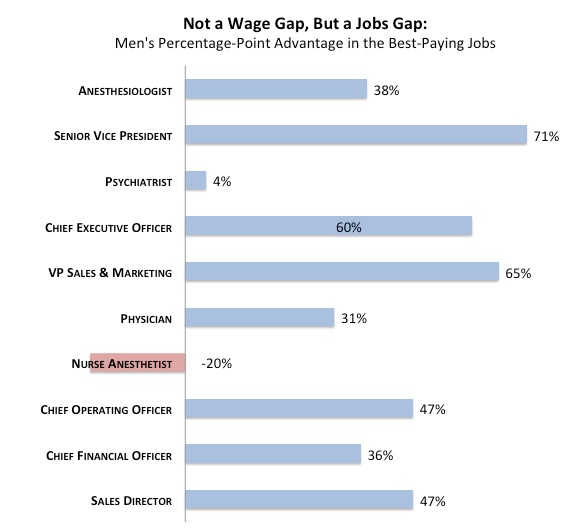 |
|
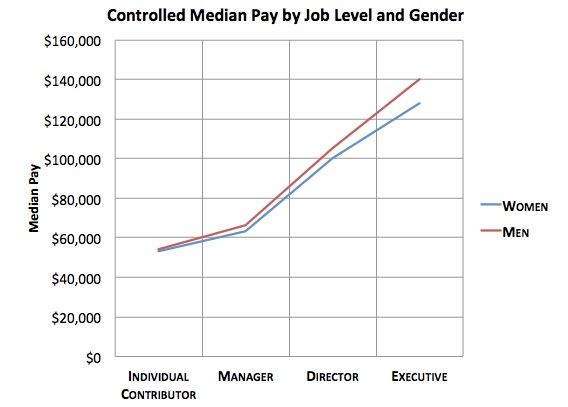 |
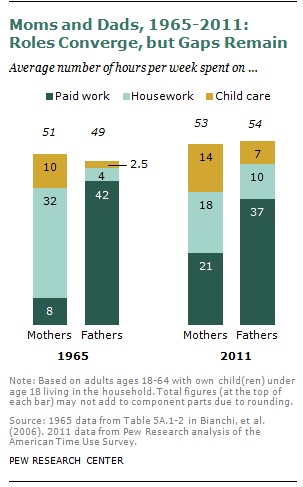 |
1996 Clinton signs Defense of Marriage Act, which passes Congress 85-14 in Senate (both Ca. Dem. Senators, Feinstein and Boxer, vote no) and 342-67 in House. It defines marriage as between only one man and one woman. In Romer v. Evans, Supreme Court rules that Colorado Amendment 2, which strips all civil-rights and antidiscrimination protection from gay men and lesbians, is an unconstitutional violation of the equal protection clause that denies gays and lesbians "ordinary civic life in a free society": Kennedy writes, "a law declaring that in general it shall be more difficult for one group of citizens than for all others to seek aid from the government is itself a denial of equal protection of the laws in the most literal sense....It is not within our constitutional tradition to enact laws of this sort." California Prop. 209, which "prohibits state, local governments, districts, public universities, colleges, and schools, and other government instrumentalities from discriminating against or giving preferential treatment to any individual or group in public employment, public education, or public contracting on the basis of race, sex, color, ethnicity, or national origin," passes by 54%. Michigan passes a similar law, 2006 (see 2003).
1998 voters in Hawaii pass the nation's first defense-of-marriage amendment to the state constitution 69-31.
1999 Vermont creates civil unions, first state to allow same-sex couples the
privileges of opposite-sex couples
2003 in Grutter v Bollinger, Supreme Court holds that U. Michigan's law-school admission policies, which consider race, are constitutionally acceptable, for now, as a "tailored use" of racial preferences, but also holds, in Gratz v Bollinger, that UM's undergrad admission policies, which award students points based on race, are quotas and therefore illegal.
Lawrence v. Texas (6-3 decision) undoes Bowers v Hardwick. From Kennedy's decision: "The statutes seek to control a personal relationship that is within the liberty of persons to choose without being punished as criminals....The rationale of Bowers does not withstand careful analysis. Bowers was not correct when it was decided and it is not correct today....As the Constitution endures, persons in every generation can invoke its principles in their own search for greater freedom."
decriminalization of homosexuality by state: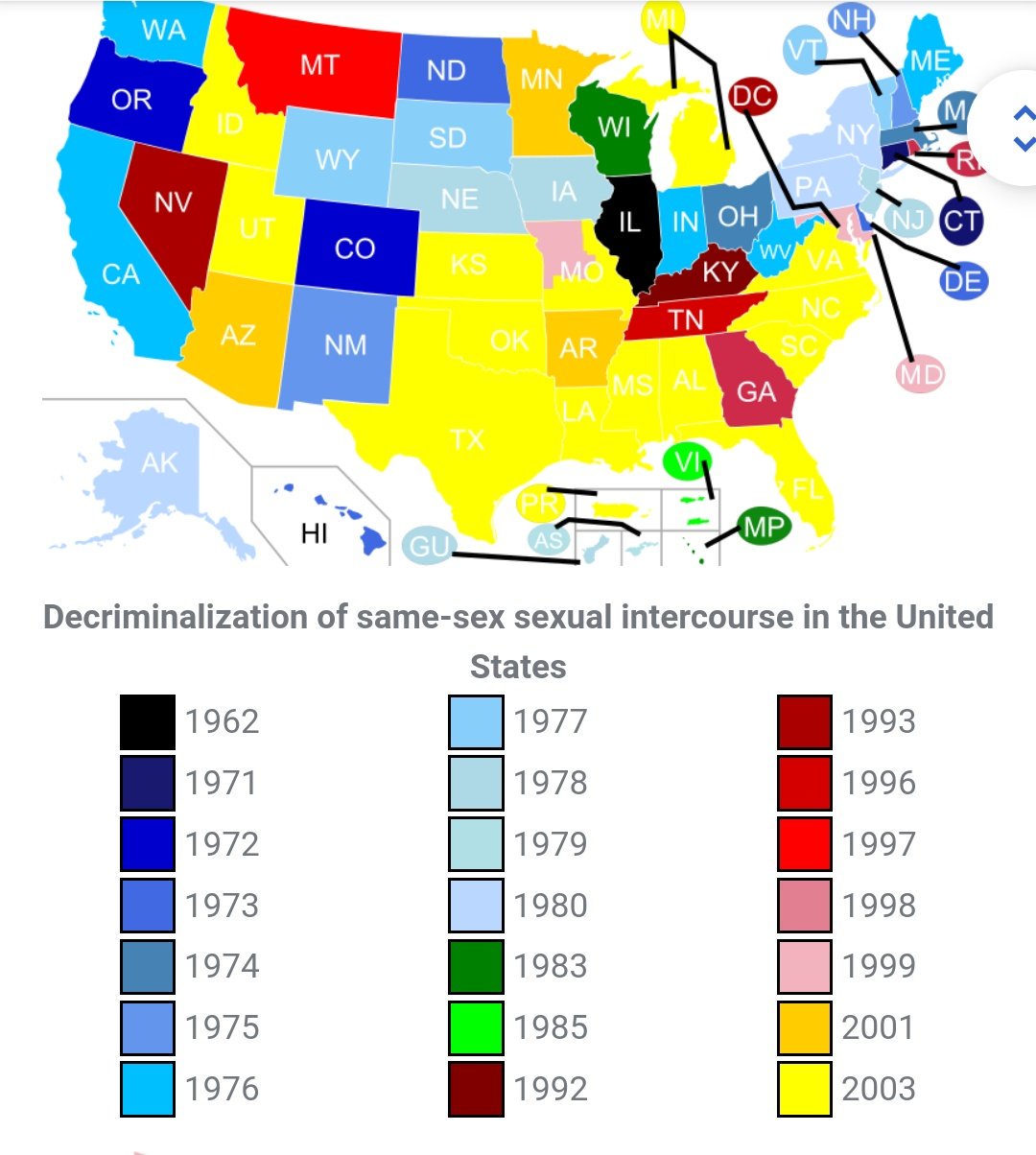
Rick Santorum on Lawrence: this pro-gay rights ruling would allow bigamy, polygamy, incest, adultery, and "man on child, man on dog, or whatever the case may be." Supreme Court justice Antonin Scalia's dissent accuses the court of "largely sign[ing] on to the so-called homosexual agenda, by which I mean the agenda promoted by some homosexual activists directed at eliminating the moral opprobrium that has traditionally attached to homosexual conduct....Many Americans do not want persons who openly engage in homosexual conduct as partners in their business, as scoutmasters for their children, as teachers in their children’s schools, or as boarders in their home. They view this as protecting themselves and their families from a lifestyle that they believe to be immoral and destructive. The Court views it as 'discrimination' which it is the function of our judgments to deter. So imbued is the Court with the law profession’s anti-anti-homosexual culture, that it is seemingly unaware that the attitudes of that culture are not obviously 'mainstream'; that in most States what the Court calls 'discrimination' against those who engage in homosexual acts is perfectly legal." As you may have heard, Duncan Hosie (UHS '12) challenged him on it in public.
2004 on the 50th anniversary of Brown, a lot of people think it failed, or was set up wrong in the first place; some numbers and examples of where things were
2007 Supreme Court holds that public elementary schools' use of racial categories in admissions violates the 14th Amendment. John Roberts: "The way to stop discrimination on the basis of race is to stop discriminating on the basis of race." Breyer's dissent: the decision is one "the court and the nation will come to regret. The lesson of history is not that efforts to continue racial segregation are constitutionally indistinguishable from efforts to achieve racial integration. Indeed, it is a cruel distortion of history to compare Topeka, Kansas, in the 1950s to Louisville and Seattle in the modern day." Between 1994 and 2004, the percentage of Americans preferring the male breadwinner/female homemaker family model actually rises to 40 percent from 34 percent. Between 1997 and 2007, the number of full-time working mothers who say they would prefer to work part time increases to 60 percent from 48 percent. In 1997, a quarter of stay-at-home mothers say full-time work would be ideal. By 2007, only 16 percent of stay-at-home mothers want to work full time.
2010 Don't Ask Don't Tell is ruled a violation of the 1st and 5th Amendments;
Congress passes laws ending the policy, which Barack Obama signs Dec. 22. A
New York Times analysis of schools data for the 2009-10 school year
finds that New York’s public-school system remains one of the most segregated
in the nation. While the city’s public-school population looks diverse
— 40.3 percent Hispanic, 32 percent black, 14.9 percent white and 13.7
percent Asian — many of its schools are nothing of the sort. About 650
of the nearly 1,700 schools in the system have populations that are 70 percent
a single race; more than half the city’s schools are at least 90 percent
black and Hispanic. 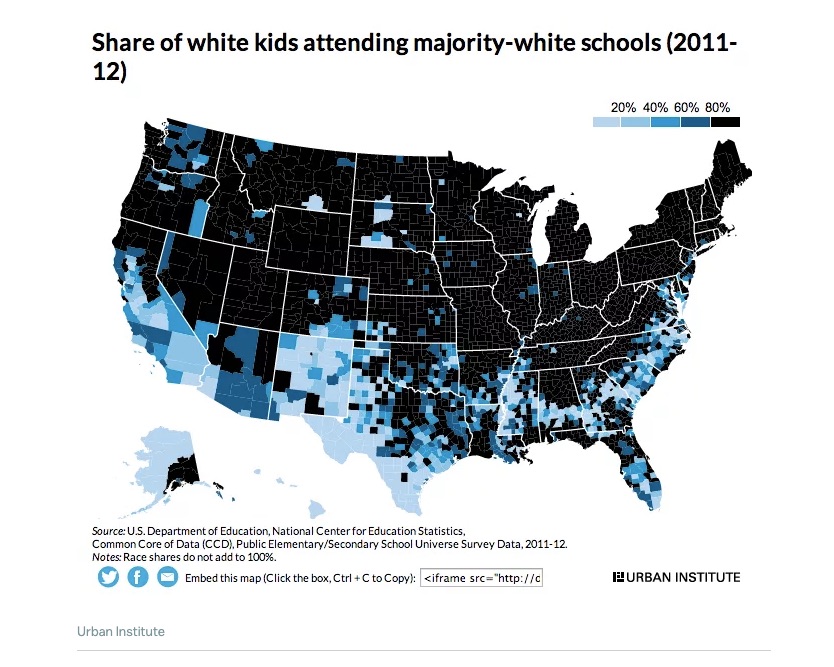
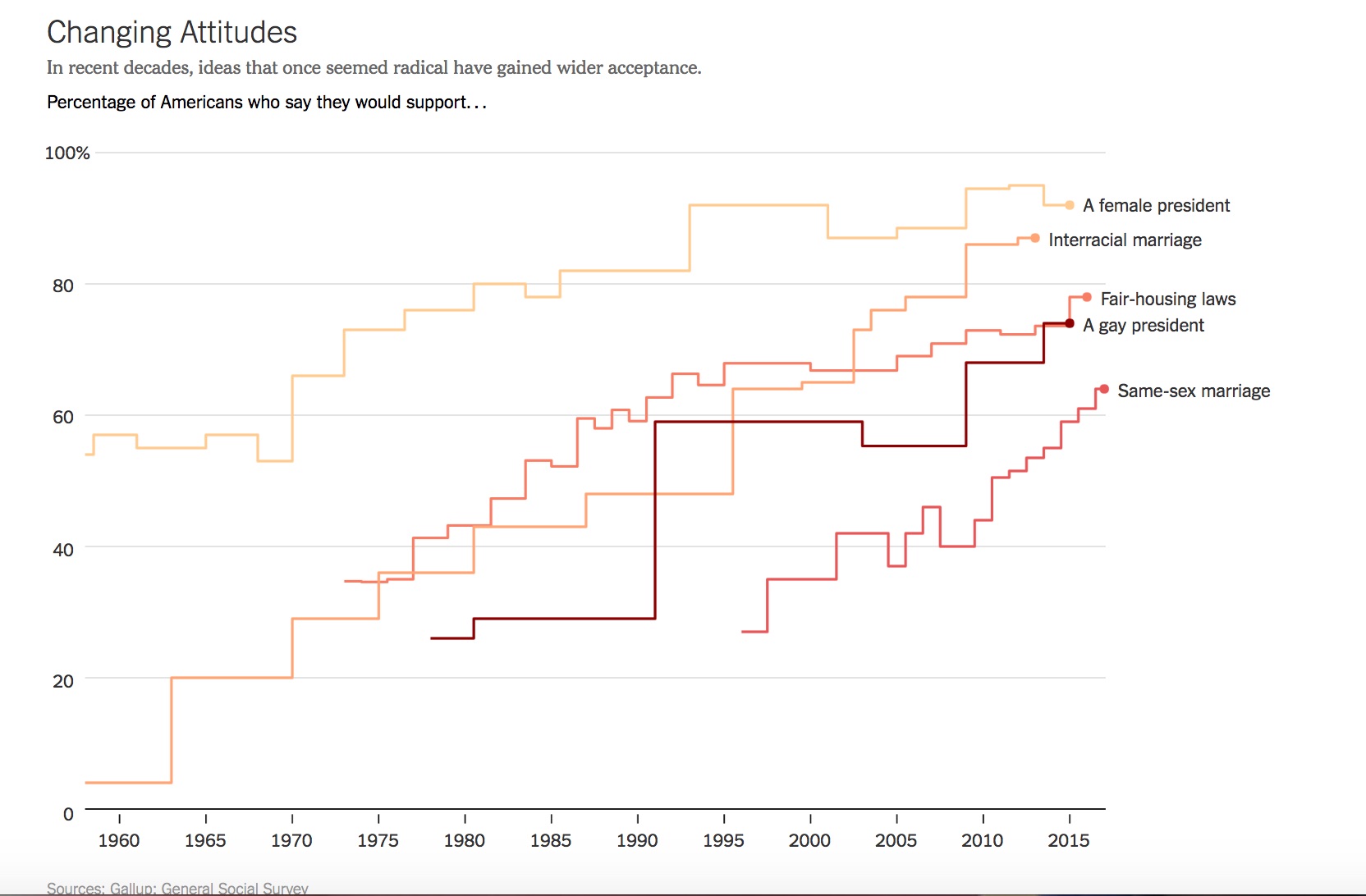
2011 Feb.: Obama administration states that it will cease legal defense of the Defense of Marriage Act. A 2011 study by the Center for Work and Family at Boston College found that 65 percent of the fathers they interviewed felt that mothers and fathers should provide equal amounts of caregiving for their children. And in a 2010 Pew poll, 72 percent of both women and men between 18 and 29 agreed that the best marriage is one in which husband and wife both work and both take care of the house. But only 30 percent of the fathers who wanted to share child care equally with their wives actually do so.
April poll data:
in Georgia, 47% of Republicans are content with the Union victory, while 31%
wish the South had won. Democrats (58/17) and independents (54/19) are both
strongly supportive of the North, making the overall numbers 53/23. In North
Carolina GOP voters are almost evenly divided on the outcome of the war, with
35% glad for the North's victory, 33% ruing the South's loss, and 32% taking
neither side. Democrats (55/15) and independents (57/14) have similar numbers
to Georgia but due to the greater ambivalence of Republicans about the northern
victory, overall less than half of Tar Heel voters (48%) are glad the Union
won to 21% who wish the Confederacy had. In Mississippi no group of the electorate
seems all that enthused about the North having won. Republicans, by a 38/21
margin, outright wish the South had won. Democrats (39/22) and independents
(49/15) side with the North but compared to those voter groups in North Carolina
and Georgia they're pretty ambivalent. Overall just 34% of voters in the state
are glad the Union prevailed to 27% who wish the rebels had been victorious.
A plurality of Republicans in Mississippi think interracial marriage should be illegal. Democrats there think it should be legal by a 68/18 margin and independents do so 56/21, making the overall numbers in the state 54% who think it should be legal to 28% who believe it should be illegal. GOP voters in North Carolina and Georgia don't have the same hang-up about interracial marriage that their peers in Mississippi do. In Georgia Republicans think it should be legal by a 52/29 spread. Democrats do so 67/20 and independents do 74/13, making the overall numbers 62/22. And in North Carolina Republicans think it should be legal by a 55/30 spread. Democrats do so 74/15 and independents do 80/11, making the the overall numbers 68/20.

2012 May Barack Obama supports gay marriage: "over the course of several years as I have talked to friends and family and neighbors when I think about members of my own staff who are in incredibly committed monogamous relationships, same-sex relationships, who are raising kids together, when I think about those soldiers or airmen or marines or sailors who are out there fighting on my behalf and yet feel constrained, even now that 'Don't Ask Don't Tell' is gone, because they are not able to commit themselves in a marriage, at a certain point I’ve just concluded that for me personally it is important for me to go ahead and affirm that I think same-sex couples should be able to get married"; while 50% of Americans approve of same-sex marriage, a further breakdown of the numbers shows a significant gender gap: Fifty-six percent of women say couples of the same gender should be legally allowed to marry, but 42% of men feel the same way. Sen. Rand Paul of Kentucky, son of Republican presidential candidate Ron Paul, says he "wasn't sure that (Obama's) views on marriage could get any gayer," sparking laughs at an event held by Iowa's Faith and Freedom Coalition. Republican National Committee Chairman Reince Priebus also makes headlines when he says that same-sex marriage was not a "matter of civil rights. I think it's just a matter of whether or not we're going to adhere to something that's been historical and religious and legal in this country for many, many years. I mean, marriage has to have a definition, and we just happen to believe it's between a man and woman."
2013 Supreme Court more or less revokes Article V of Voting Rights Act; overrules DOMA, rules that proponents of California's Prop. 8 do not have standing to sue for its enforcement. Legalization of gay marriage:
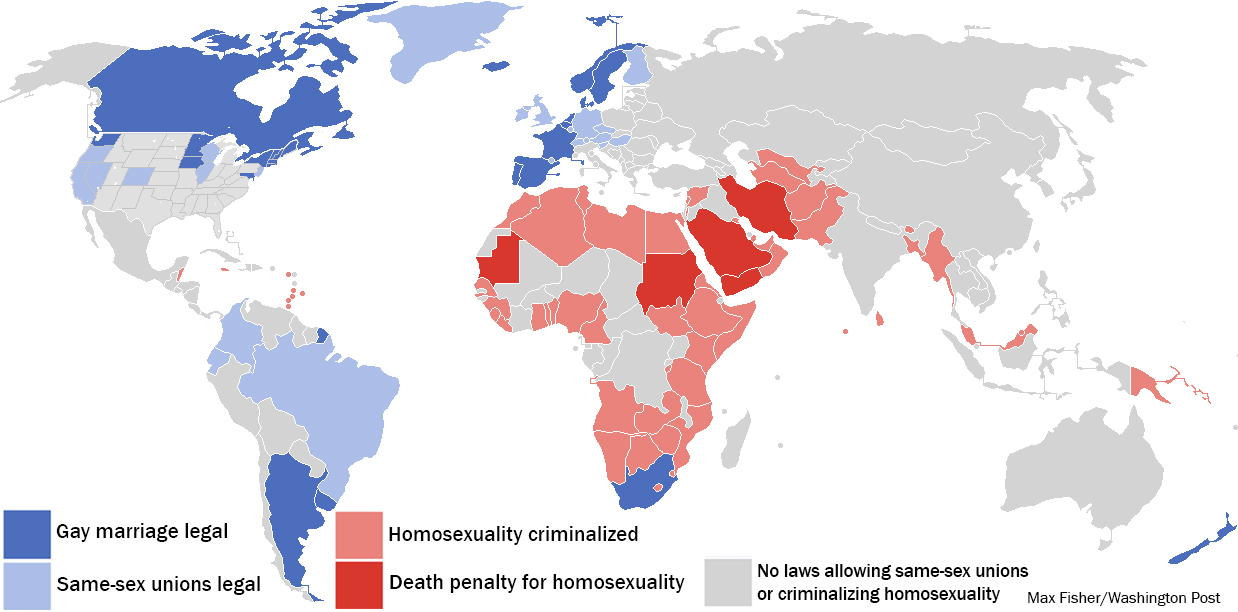
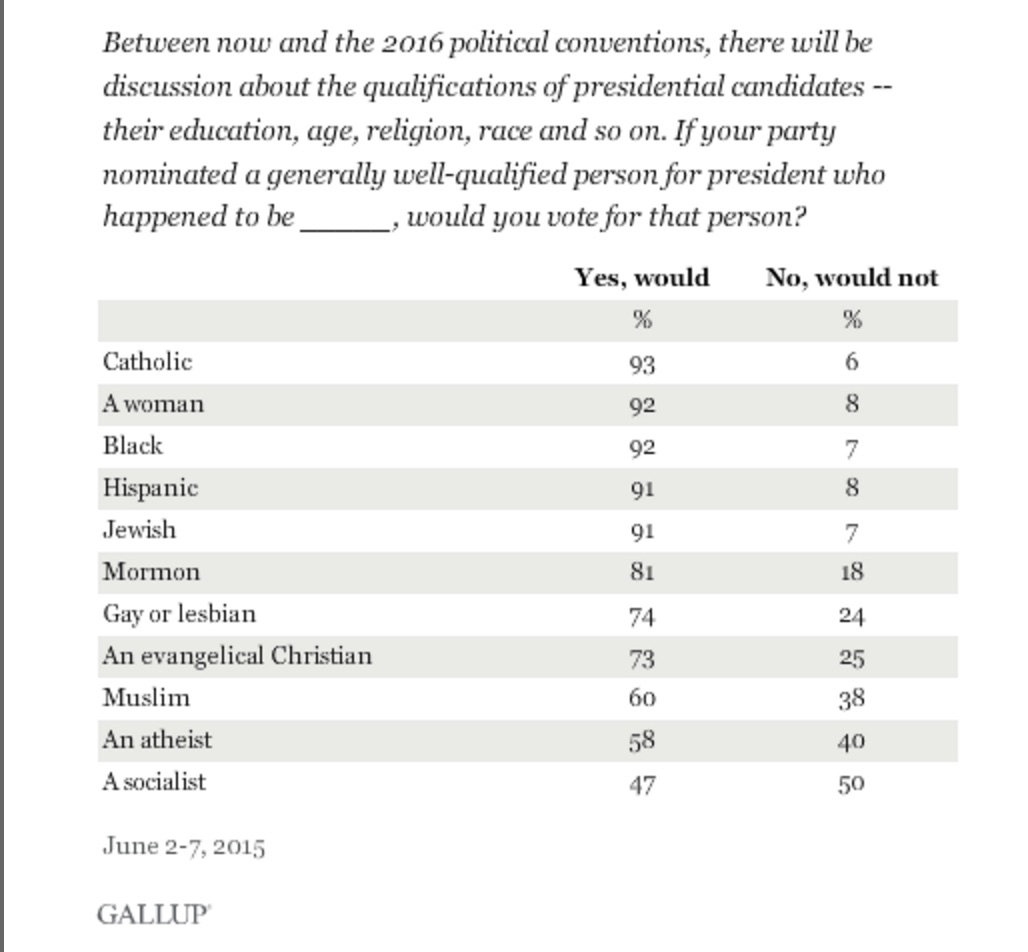
Since its falure, the ERA has repeatedly been introduced in Congress, including a slightly rewritten version in this last session, since its failure in 1982. (See #1 and #3.) Jackie Speier (D-Ca) introduced a resolution to remove the ratification deadline retroactively, so that ERA would be back at 35 states and would be law as soon as 3 more states ratified. Supporters have tried to argue that, since 35 states ratified the ERA, it should already be in effect in those states. The answer here (#5, 7 on the link) points out that it's "more of a political question than a constitutional one." According to item 7, 23 states have some version of this--including Florida, Illinois, Utah, Virginia and Louisiana, all of which rejected the amendment.
Comparisons with Europe:
England passed the Sex Discrimination Act in 1975. It protects many of these rights: prohibits direct and/or indirect gender discrimination against individuals in the areas of employment, education, the provision of goods, facilities and services. Finland passed the Act on Equality Between Women and Men in 1987. France has a pretty good record since 1971.
Many Americans not only support the ERA's aims but believe that it actually did pass: in April 2012, a poll for Daily Kos/Service Employees International Union (SEIU) asked, “Do you think the Constitution should guarantee equal rights for men and women, or not?” The responses were 91% yes, 4% no, and 5% not sure. An Opinion Research Corporation poll commissioned in 2001 by the ERA Campaign Network of Princeton, NJ showed that nearly all U.S. adults – 96% – believe that male and female citizens should have equal rights. The vast majority – 88% – also believe that the U.S. Constitution should make it clear that these rights are supposed to be equal. However, nearly three-quarters of the respondents – 72% – mistakenly assume that the Constitution already includes such a guarantee.
Whites were 83% of voters in 1996 and 72% in 1996. In 2016, whites are 69% of eligible voters in the US; they will be 64% by 2024, the Census Bureau estimates, and 54% by 2044.